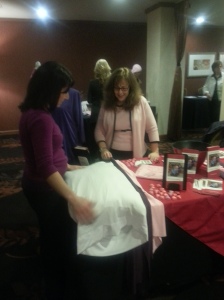Yearly my oncologist’s group puts on an evening lecture recapping new and exciting news from the San Antonio breast cancer symposium. For the last few years my company has had a table there giving out brochures about our sleepwear. It truly is a wonderful event and I am lucky to be a part of an oncology practice willing to outreach to their patients this way. Did I mention there is food and it is free?
Before the lecture starts there is time to socialize, go around to all the tables and eat. I engage with the men and women who stop at my table. Not only am I a vendor but a survivor. These are my people!
After talking with many people I am reminded of some misconceptions. Here are a few myths that even women in the midst of treatments believe or their families believe.
Breast cancer is genetic
NOPE. Less than 10% of all breast cancers are genetic.
If you have a mastectomy you never have to worry about reoccurrence
NOPE. All it takes is one rogue gene no matter how much tissue is removed. Cancer happens.
Mammograms are expensive or not necessary
NOPE. Under health care reform, a routine mammogram screening is FREE and will pick up most abnormalities of women with out dense breasts. Imaging offices are open 6 days a week and often from 6 AM to 8PM. There is no excuse to not get a yearly mammogram if you are over 40. They save lives!
Here are a couple of advancement take-aways from the lecture:
Immunotherapy treatments are showing promise for breast cancer. It targets the immune system not the tumor. The tumor may take time to respond and often get worse before it gets better but it is another tool in the oncologist’s arsenal.
Adjuvant Hormone Therapy Duration is benefiting from the research on 5-10 years of patients taking tamoxifen and or aromatase inhibitors. Promising reoccurrence and mortality rates are seen up to 15 years after the patient has completed her program. The balance of toxicity versus benefit of extended therapy use is the tipping point.
So there you have it. Did you learn an interesting fact? Have you scheduled your mammogram?













![breast%20cancer[1]](https://haralee.files.wordpress.com/2012/10/breast20cancer1.jpg?w=426)




